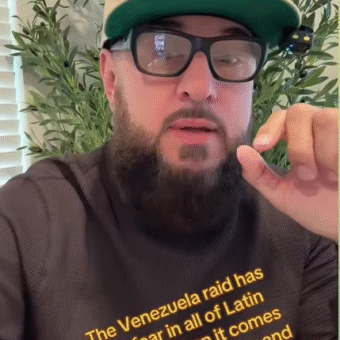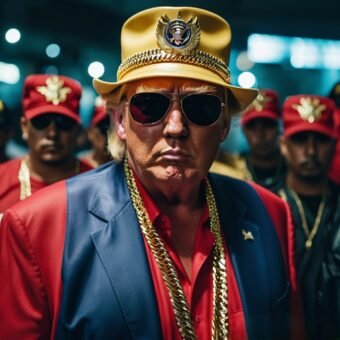From lawfare to a tripwire
Featured Image: Burnt and shredded, legal text and law book.
By Nat South
With the destruction of a fishing launch in the Southern Caribbean on Tuesday, it seems to me that the U.S. military operations against Venezuela have taken another turn for the worst. Previously, the emphasis was targeting the high-level officials with U.S. indictments in 2020, bounties doubled this summer and official threats. However, this year, ordinary people have been singled out and this week actually targeted.
Maybe some are criminals, but there is no definite evidence put out publicly to show that this is the case. A case in point were the deported Venezuelan individuals who were arbitrarily detained in El Salvador’s CECOT jail in March / April, without trial, without access to legal representation. All done on the basis of the U.S. administration allegations that they were gang members, belonging to the “Tren de Aragua”. It turned out that most of those jailed in CECOT had no criminal records and were solely identified as gang members solely based on ordinary tattoos that they had.
The U.S. actions not only fit a pattern of stigmatising, criminalising Venezuelan migrants, criminalising them, but now extra-judicial killings off their coast. Not that this is new, as it seems that every president has to have his hands bloodied, whether it is Yemen, Sudan, Syria.
Colombian president Gustavo Petro quite rightly stated that the attack on the boat “breaks the universal principle of proportionality and is murder.” Then he shows one example of a maritime interdiction carried out by Colombian forces:
Petro also highlighted the stark contrast with the U.S. operation: “We have been capturing civilians who transport drugs for decades without killing them”. President Petro added that “those who transport drugs are not big narcos, but very poor young people from the Caribbean and the Pacific.”
Very true words, people who are at the lowest level of the drug cartel structures. While the “big fish” swim freely. This type of heavy handed response is actually counterproductive, in tracking and investigating the shipments and destinations of illicit narcotics, so it doesn’t help to dismantle the rest of the routes and traffickers and more importantly, the money trail. Not that it matters to Washington policy-makers, as even the Mexican president Sheinbaum, has pointed some home truths about the thriving ‘narcostate’ in the U.S.
US secretary of defense Hegseth stated on U.S. media that: “This is a deadly, serious mission for us and it won’t stop with just this strike”. He added that, “anyone else trafficking in those waters who we know is a designated narco-terrorist will face the same fate.” He stated that he watched the operation live.
Meanwhile the head of states that are under the U.S. proxy umbrella are supportive of the U.S. military, including, Kamla Persad-Bissessar, the prime minister of Trinidad and Tobago, who praised the attack, saying all drug-traffickers should be “violently eliminated.” Another candidate for inclusion in the 21st century version of “Operation Condor”, with the following statement: “I feel no compassion for them, the U.S. Army should have them all violently eliminated.”
Personally, I feel that this is the ominous start to another encirclement of Venezuela, by using a series of tripwires to antagonise the authorities in Caracas, as well as increasingly draw in the likes of Guyana and Trinidad and Tobago into being useful sidekicks. All of which spins the wheels of the U.S. driven narratives.
In my opinion: This latest action maybe was done to try to start to lure out the Venezuelan navy and military, which has started exercises several days ago, operation “Bicentennial of the Sword of Peru ” As such, the U.S. may possibly provoke a false flag incident, thus providing a casus belli for the U.S. to swing into a limited military action against the Venezuelan authorities.
Two F-16s of the Venezuelan Air Force flew by one of the U.S. warships, the USS Jason Dunham, in move described by the the US Department of Defense as “highly provocative” and also stated it was done“to interfere with our counter-narco-terror operations”.

“The cartel running Venezuela”
A double take: FONOPS and counter-narcotics ops
The U.S. navy might carry out other raids and targeting, as well as a FONOP*, (like they did several times in 2022 and 2020, possibly in the same area as where the speedboat was destroyed). The 2022 FONOPs were done at a time when oil tankers from Iran were arriving to the shores of Venezuela. In 2020, tankers were seized by the U.S., while an “enhanced counter-narcotics operation” in the region was taking place. Now, five years on, another one is underway.
*freedom of navigation operation, (U.S. unilateral military operations, taking advantage of UNCLOS, while not actually being a signatory of it). I have written about in previous articles and interestingly, a Chinese think tank has carried out research into this U.S. military shtick, (read here).
The Western MSM take
True to style, the UK mainstream media outlet went for ‘ kinetic’ in the headline, much less emotional than massacre. In full stenographer mode no less.

The word ‘kinetic’. That reminds me of this:
Legalities and not niceties

Screenshot of BBC headline on legality of military strike on boat, along with obligatory question format.
It was certainly illegal, even if it was in international waters.
- Was there a ‘hot pursuit’?
- Were there radio warnings and “shots across the bow”?
- Were the U.S. military under imminent danger or attack?
The U.S. has not provided any legal context for authorising the destruction of the boat. Rubio, Trump and Hegseth all have parroted the same narrative, accusing Maduro of operating and having close connections to drug trafficking cartels, (Tren de Aragua, Cartel de los Soles) in Venezuela, by stating that Maduro has been indicted by a U.S. court, (there is a fine example of extra-territoriality lawfare at work).
Echoing what Hegseth had said to Fox News the day before, the US Secretary of State Marco Rubio, while visiting Mexico, told the press on Wednesday that strikes on drug-carrying boats will continue. The U.S. has so far failed to offer any credible evidence to justify the military operation, that would be compatible with international law norms. Rubio went further and dismissed the fact finding UN reports.
It is telling that the overall majority of the U.S. intelligence community couldn’t find credible links between the Venezuelan government and Tren de Aragua, back in April. The classified report was released by National Intelligence Council.
Both the UN Office on Drugs and Crime (UNODC), the U.S. Drug Enforcement Administration (DEA) and U.S. official agencies have not found the “smoking gun” evidence, but the Trump administration does, sufficiently to warrant the destruction of a boat? What next is in store for Venezuela?
Jointly, along with Colombian deployments, Venezuela has sent 15,000 troops to its borders with Colombia to intensify its own long-running counter-narcotics operations and other criminal activity. Not that you will see much in the Western MSM about Caracas’ efforts in tackling drug traffickers and organised crime.
The boat was in international waters, so force can be used to stop it, but it has to be proportional, (which I assume is what President Petro was referring to), with non-lethal measures in the first place, if there is no danger or risk to life to law enforcement officials pursuing the vessel. Both UNCLOS and the 1988 UN Drug Trafficking Convention have provisions on cooperation, boarding at sea and other legal mechanisms. I’m reminded of one of the longest hot pursuit on the high seas back in 2003, over 7000 km in all. It certainly encapsulated international cooperation, boarding and detention of the illegal fishing vessel. The U.S. Navy certainly could have assisted the Trinidad and Tobago authorities to intercept the boat, but none was provided. The small launch certainly wasn’t going to go all of the way to U.S. waters, over 2000km, that’s for sure. The U.S. authorities wilfully threw international law requirements in a landfill, not a bin.
The U.S enacted the designation of “Specially Designated Global Terrorist” to blur the boundaries between law enforcement and hostile military action. Certainly very slippery ground, but unfortunately, the U.S. has an extremely long bloody pedigree in this area, side stepping the international legal norms, just to be the sheriff in town.












They say that the dope racket is the financial support for the western banks. (see Big White Lie and related books) the idea that the boat was carrying dope is risible. A general rule for planing small craft is that they can’t carry enough fuel to get out of sight…they… Read more »
We hear that the little boat was on the way to Trinidad and Tobago. It could have carried Venezuelan migrants, it could have carried a bag or two of drugs … Trinidad and Tobago is a US hangout, so, I am suspecting a setup .. false flag type operation.
If the video is real, yes, the timing seemed coordinated to fit the Orange propaganda agenda…so sure, a set up…make this one run and you can keep the boat… I’ve heard of that old gag from a chief of police!